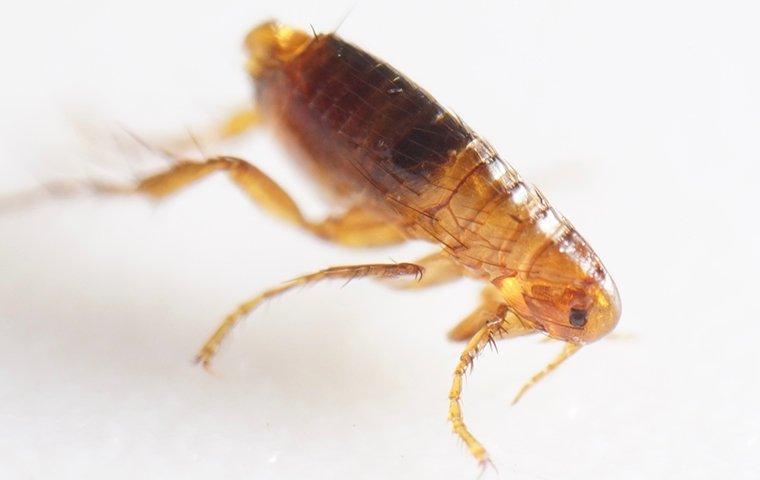
The Power Of Proactive Flea Control On Mooresville Properties
Nobody likes to see their furry family members scratching at fleas. Those irritating pests can make your dog or cat miserable. But they don't stop with your pet. They can make you miserable, too. But you don't have to let them. If you understand how fleas operate, you can get in front of flea problems.
Let's look at the life cycle of the common flea, a few health facts every Mooresville resident should know, and what proactive steps can keep fleas out. As always, we're here if you need a professional solution. Your Lake Norman Home Services technician can make short work of a flea problem in your home. Along with flea removal service, we also provide yard care to control fleas on your property. We'll tell you a bit about each of these at the end of this article.

Life Cycle And Behavior Of Fleas
A flea doesn't begin life as an insect. Did you know that? It starts as a tiny, wiggly, worm-like critter. It has no legs, like an insect, and no ability to bite, as adult fleas do. Flea larvae feed on the fecal matter of the adults to get the nourishment they need. It is helpful to understand this as flea eggs that fall off a host animal and land in a location where there is no flea dirt will not produce viable larvae. They can't survive. One condition needed for fleas to develop on your property is that wild animals must lay or sit on the ground, allowing flea eggs and flea dirt to fall in the same location.
The wiggly worm-like larvae grow and eventually cocoon themselves. Once in the cocoon, they are mostly safe from detrimental weather conditions. But the developing larvae can dry out and die off. Therefore, maintaining dry conditions around your home can help reduce the flea population.
Inside its cocoon, the flea passes through the pupal stage and becomes an adult. The adult doesn't emerge immediately. It waits. Fleas don't just bounce around, biting everything that moves. They select a host. When a furry animal passes by, the adult flea breaks free of the cocoon and springs onto it. The adult fleas on your property can stay in their cocoons for months. Managing where your pets are allowed to go outdoors may prevent exposure to fleas. Tall grass and dense vegetation are hotspots.
Once adult fleas leave their cocoons, they can't go back. If they fail to find a host animal immediately, they'll keep searching. Along the way, they may bite you quickly to obtain a blood meal to hold them over; this is why fleas bite you in your home. They don't choose humans as hosts, but they need to eat as they wait to find an appropriate host.
When a flea bites you, it will leave an itchy wound on your skin. In most cases, this is the extent of the injury. But it isn't always. Fleas can transmit diseases. But disease transmission between fleas and humans is somewhat mysterious if you don't know how it works. Let's take a quick look.
Risks Associated With Flea Infestations
If you have a pet, chances are you've dealt with fleas before, and if you have done this more than once, you may wonder if fleas actually do spread diseases. Most of the time, they don't. The reason has to do with their life cycle. The fleas in your yard that break free of their cocoons and jump onto your pets have not yet had any exposure to a disease. When your pet brings the flea indoors, it only has exposure to your pet. If your pet is well, it won't infect the fleas. So, how do fleas get diseases and spread them to you?
Fleas in your yard don't always get on your pet after breaking free from their cocoon. A flea can feed on an animal, spring off, and get abandoned when the animal scurries away. If your pet picks up a flea that has bitten an infected animal, a disease can spread to your pet and sometimes to you.
What diseases do fleas carry? The list of common diseases is a short one:
- Bartonellosis
- Murine typhus
- Tungiasis
- Tularemia
- Plague (very rare)
Once again, it is important to point out that the vast majority of fleas that bite you will not carry a disease. All of the fleas born in your home (which is most of them) will not be in contact with animals they can contract a disease from unless your pet is sick or you have a rodent infestation. Only the fleas carried in from the outdoors are likely to have a disease. For this reason, flea control should start in your yard.
Proactive Flea Control Measures
How do you keep fleas from living in your yard and riding into your home on your dog or cat? We offered a few insights earlier. Let's connect the dots and add a few more facts to help you with your proactive flea control.
Prevent Wildlife Activity: There are many ways to naturally deter furry animals from exploring your yard and choosing your property as their new home. Let's look at a few:
- Keep trash lids on and avoid overfilling your trash. Many animals, particularly raccoons, get into the trash to get a bite to eat.
- Secure your trash container lids by placing something on top, like a brick. A raccoon has no trouble lifting a lid, ripping up a trash bag, grabbing a bite of food, and putting the cover back down.
- Get your trash to the curb each week. The scent of garbage can attract the attention of animals that commonly invade trash cans.
- Remove general clutter in your yard. Rodents use ground objects to help them get around in low-light conditions. A clutter-free yard is not something any rodent wants to find.
- Store dead branches and other wood debris in containers. Many animals hide in stacked wood and brush piles. They also feed on bugs that hide in these natural places.
- Apply hardware cloth to block access to the void under your deck, stairs, shed, and other structures in your yard. Doing this will prevent a raccoon, skunk, rat, opossum, or some other animal from establishing a home and bedding down.
Address Moisture: When flea eggs fall in dry areas, their larvae will have difficulty surviving. The key to controlling damp conditions is to address ground saturation. When the ground is full of water, puddles linger.
- Get your gutters all cleaned out so that water is able to flow down and away from your exterior.
- Patch gutter damage so rainwater doesn't spill out and dampen your soil.
- Repair sprinklers, hoses, spigots, and other plumbing.
- Address areas of poor gradation or install a French drain.
- Trim landscape vegetation, remove unwanted grass, pluck the weeds, and blow out the leaves.
- Trim tree canopy over densely shaded areas that stay humid. Doing so allows the sun to dry the moisture.
- Keep your grass cut and remove hanging vines.
Seal Rodent Entry Points: While rodents don't typically carry cat fleas, the most common fleas that plague dogs and cats, having them in your home can make your flea problems more troublesome. Here are some ways to keep them out:
- Apply expanding foam around utilities, such as PVC wire conduits and plumbing pipes.
- Apply mortar to pack foundation cracks.
- Repair damaged door seals or frames.
- Align double doors that lead into basement areas.
- Protect gaps in storm cellar doors.
Consider Routine Treatments: When you have flea and tick yard treatments, these pests can't live near you. Routine treatments knock down adult fleas and leave residual control to address any fleas that hatch from eggs or break free from their cocoons.
Are you ready to get liberated from fleas in your yard? Contact Lake Norman Home Services for assistance in Mooresville. We're here to answer questions and help you better understand the way flea treatments work.
Let's end by looking at what licensed professionals do to address fleas inside your home and why we believe that going with a professional is the way to go.
Why Professional Pest Control Is Key To Total Flea Control
As you can see, your pest control service provider knows quite a bit about fleas—probably too much. That's why the pros at Lake Norman Home Services are best suited to address a flea infestation in your home. We systematically address the cycle of infestation on the interior and consider all of the extraneous conditions and factors present. We address the entire problem, not just the fleas.
When you need yard treatments, a home pest control service provider is the best option for this as well. Not only do we apply the correct materials in appropriate amounts, but we bundle your flea control with other pest management. For example, Lake Norman Home Services's My Elite plan covers ants, spiders, crickets, rodents, wasps, drain flies, stink bugs, and more. So, while keeping fleas off your pets and out of your home, we also prevent other pest problems.
Contact your Lake Norman Home Services team for service if you need flea control in Mooresville. We'll help you find the right level of control for the pests that matter most to you.


Customer Reviews
-
“Lake Norman pest control does a wonderful job all around and even explained the safety concerns I had of the products for my new baby and dog.”- Lauren G.
-
“Lake Norman Pest Control has always been consistent with their service quality and more than fair with pricing.”- Michael C.
-
“He called me after the appointment and gave me a summary of the service and he made some additional recommendations.”- Leslie Z.
-
Jake promptly arrived and asked what issues we were having and quickly began applying treatment. He was professional and thorough. Very pleased with the service today.- Lisa C.
-
“Jake promptly arrived and asked what issues we were having and quickly began applying treatment.”- Lisa C.
-
“Lake Norman always does a great job in communicating and shows up at their committed times.”- Mike C.
-
“Michael has beHe and every representative we’ve worked with from this company have been very kind and good at listening to our needs. en super helpful! He's prompt, thorough, and responsive to all of our questions.”- Kimberly G.
-
“Our technician, Jake, has been very helpful. He has been on time and responsive to all my questions.”- Laurence P.


Why Choose Lake Norman Home Services?
-
Give A CrapDelight others by owning your role and saying yes. Take pride in how you appear & act & every other detail of the job. Be on time, attentive, & enthusiastic. Act as if the buck stops with you on every aspect of the job.
-
Chase PerfectionChase Perfection, knowing full well we will not reach it, but along the way we will catch excellence. Have a sense of urgency; Go-Forth Time - right now might be the only time you have to get it right.
-
Dig Deeper
Be an action-oriented professional that makes decisions based on evidence rather than stories & assumptions. Stay curious. Data can speak for itself.
Understand the cause of the fire rather than rushing to extinguish it.
-
Fight For SimplicityKeep it simple & consistent. Focus on how things should be done every time.
-
Face It, Fix ItConfront challenges directly and address issues head-on. A bias for action and powerful conversations drive our progress. It’s about getting it right rather than being right.
-
Grow!Growth is our purpose. Growing as people & growing our business.